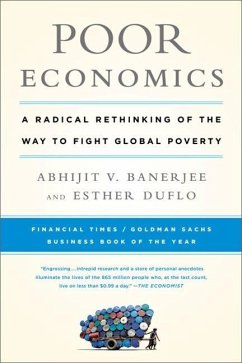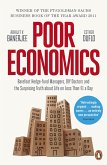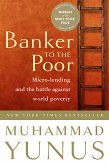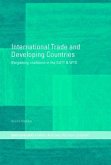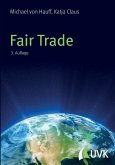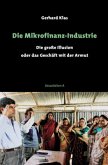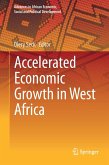The winners of the Nobel Prize in Economics upend the most common assumptions about how economics works in this gripping and disruptive portrait of how poor people actually live.
Why do the poor borrow to save? Why do they miss out on free life-saving immunizations, but pay for unnecessary drugs? In Poor Economics, Abhijit V. Banerjee and Esther Duflo, two award-winning MIT professors, answer these questions based on years of field research from around the world. Called "marvelous, rewarding" by the Wall Street Journal, the book offers a radical rethinking of the economics of poverty and an intimate view of life on 99 cents a day. Poor Economics shows that creating a world without poverty begins with understanding the daily decisions facing the poor.
Hinweis: Dieser Artikel kann nur an eine deutsche Lieferadresse ausgeliefert werden.
Why do the poor borrow to save? Why do they miss out on free life-saving immunizations, but pay for unnecessary drugs? In Poor Economics, Abhijit V. Banerjee and Esther Duflo, two award-winning MIT professors, answer these questions based on years of field research from around the world. Called "marvelous, rewarding" by the Wall Street Journal, the book offers a radical rethinking of the economics of poverty and an intimate view of life on 99 cents a day. Poor Economics shows that creating a world without poverty begins with understanding the daily decisions facing the poor.
Hinweis: Dieser Artikel kann nur an eine deutsche Lieferadresse ausgeliefert werden.

Die Entwicklungsökonomie ist festgefahren: Viel Geld für die Armen fordern die einen, gar kein Geld die anderen. Bei Banerjee/Duflo kommen die Armen selbst zu Wort: Warum sie lieber einen Fernseher kaufen, als sich einigermaßen gut zu ernähren, warum sie sparen könnten und es nicht tun und warum ein Mikrokredit nicht reicht, um zum Unternehmer zu werden. Ein anregendes und zugleich verstörendes Buch.
ank.
Abhijit V. Banerjee u. Esther Duflo: Poor Economics. Plädoyer für ein neues Verständnis von Armut. Knaus, 22,99 Euro.
Alle Rechte vorbehalten. © F.A.Z. GmbH, Frankfurt am Main
By the winners of the 2019 Nobel Prize in Economics

